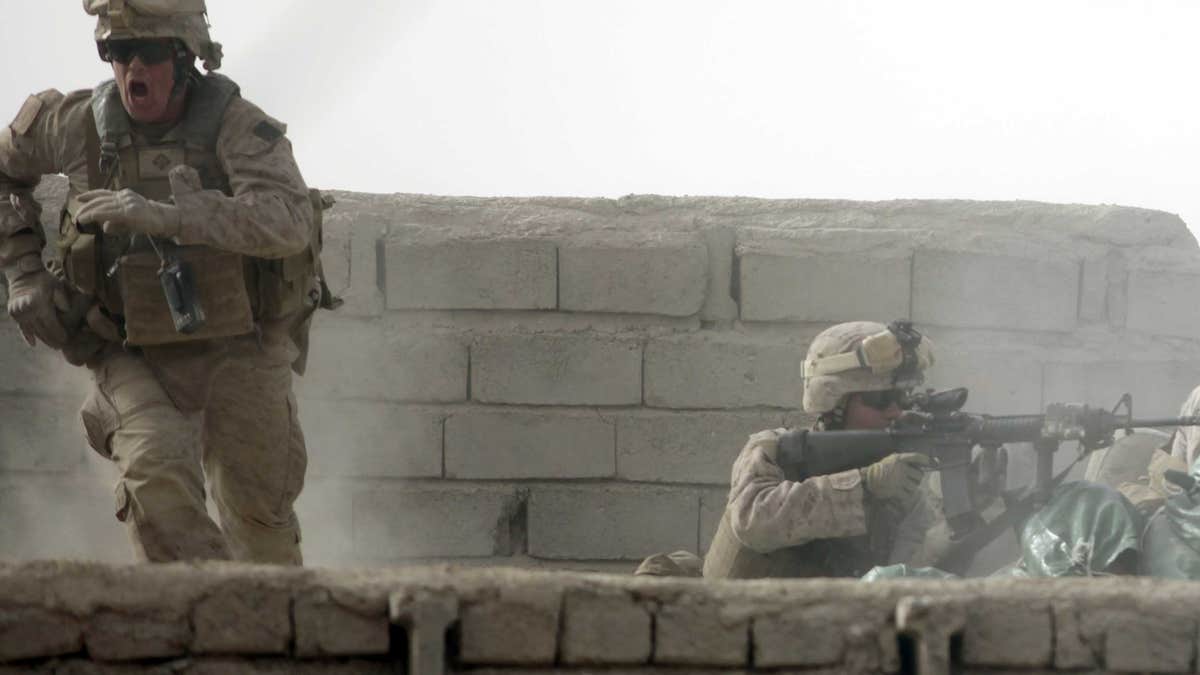
Feb. 14: A U.S. Marine from Bravo Company of the 1st Battalion, 6th Marines runs during a heavy gun battle in the town of Marjah, Afghanistan.
Success behind the new offensive in Afghanistan is based on more than just military, President Obama's national security adviser said Sunday.
The new offensive in Marjah, Afghanistan, is to bring together critical components, including more U.S. troops, more civilians on the ground to work with the military and international aid, said Gen. James Jones.
"It is the first major operation in which we will demonstrate, I think successfully, that the new elements of the strategy which combine not only security operations but economic reform and good governance at the local and regional level, with a much more visible presence of Afghan forces, will take place," Jones told "Fox News Sunday."
"The combination of all these things, I think, is going to give the people of the southern part of this country a renewed sense that this is the -- this is their destiny and they can help shape it in a very powerful way over the next few weeks," he said.
The operation launched late last week is the biggest fight in Afghanistan since 2001 and the first major offensive since President Obama announced a surge of U.S. troops in the country.
Reuters quoted one Marine saying the intensity of the fight is just as strong as it was during the battle of Fallujah in Iraq in 2004, a comparison that is apt, said Capt. Pete Hegseth, chairman of Vets for Freedom, because the tactics used by the Taliban are similar.
Hegseth told Fox News that terror fighters are placing improvised explosive devices in every corner, posting snipers at far distances and triggering houses for explosion when they are raided by coalition forces.
But Hegseth said the fight is perhaps more fierce than in Iraq because the Taliban are in many ways "a very sophisticated enemy, and they've had years to entrench themselves."
"The Taliban have been experienced ... for decades they've been fighting what they've deemed to be foreign fighters," he said. "It's a much more experienced crew of fighters than what we saw in Fallujah in Iraq."
Hegseth agreed that U.S. and NATO forces need to "literally clear, build and hold" the area so Afghans in Helmand Province know that the allies are committed to their security.
The fighting is certainly terrifying for civilians -- in fact a misfire Saturday killed a house filled with 12 non-combatants. Gen. Stanley McChrystal, the top general in Afghanistan, said the use of high mobility artillery rocket systems have been suspended until the incident has been reviewed.
After the fighting ends, NATO is preparing to put aid and supplies in the region as quickly as possible and restore services so that people living in Helmand Province lose any remains of loyalty to the Taliban, Jones said.
Jones added that the result will be felt countrywide.
"It's the cohesion that now exists between all elements of national power and international power that are coming together and will be a very, very good and, I think, successfully demonstrated and executed operation that is going to make a big change in not only the southern part of Afghanistan but will send shock waves through the rest of the country," he said.












































